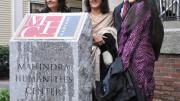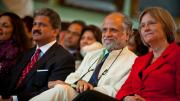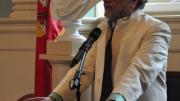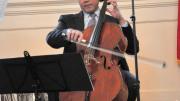When Anand Mahindra ’77, M.B.A. ’81, was deciding where to go to college, he sought out Harvard for its liberal-arts education, which contrasted sharply with the engineering training held up as the pinnacle of achievement by many Indian families. When the Indian government would not pay for his education, Harvard offered him a full scholarship. He concentrated in film studies, and subsequently enrolled at the Business School. Now vice chairman and managing director of the Indian multinational firm Mahindra & Mahindra, he recounted that earlier decision at a University Hall ceremony on April 25, in explaining his $10-million gift to endow Harvard’s humanities center. “I need hardly clarify,” Mahindra remarked, “that if I stand here before you today, it is from a deep desire to repay this extraordinary act of liberalism and generosity by this University so many years ago.”
The renamed Mahindra Humanities Center (MHC) honors Mahindra’s mother, Indira Mahindra, whom he called “directly responsible” for his commitment for the humanities. “She had a passion for life and all its offerings, and I think that was greatly responsible for the success I have enjoyed,” he declared. “So welcome, mother, wherever you are, to Harvard, because you belong here as much as my father or I or your grandchildren who went here.”
In her speech, President Drew Faust noted that “when Anand was asked by the Hindustani Times why he was giving such an extraordinary gift…he said, ‘What the humanities teach you is not a particular skill or technology, but to think and to question. Conflict resolution and creating a better world do not come from an improved piece of software or a better engine or a technology, but from people who can break free from their rigid points of view.’…So today, we celebrate the freedom his gift will provide for so many at Harvard: the freedom to explore together, to argue, to debate, to follow our curiosity, to ask questions that transport us—to take a critical perspective, to see how the world has been and can be different.”
The inauguration of the MHC marks a second birth for an already well-established institution. The humanities center evolved out of an ongoing seminar on literary studies that began in the mid-1980s, and developed a life of its own when it moved into the newly renovated Barker Center in 1996. The center undertook more of its own programming, managing conferences, symposia, and lectures, and hosting seminars on a wider variety of topics, ranging from the history of the book to cognitive science and the arts. It now hosts both the Charles Eliot Norton and Tanner lectures; provides significant graduate and postdoctoral fellowship opportunities; and manages a number of talks and colloquia, including the Master Class and 20 Questions series.
The MHC’s director, Rothenberg professor of the humanities Homi Bhabha, says the center aims not only to bolster the humanities departments, but also to foster positive interactions with other disciplines and faculties, and to open up humanistic inquiry to people outside Harvard: “We aspire to be the crossroads of the University”—a place where ideas from different departments and schools intersect and flourish. Before Mahindra’s gift established its endowment, the MHC operated principally on a mixture of Faculty of Arts and Sciences (FAS) and presidential funds. “I hope the gift will allow us to further develop the mission of the Center and to help us to both nationalize it and internationalize it—to take much larger strides and make much wider and longer connections,” Bhabha adds.
Michael Smith, dean of FAS, voiced similar aspirations during the inaugural celebrations, which included performances from Yo-Yo Ma ’76, D. Mus. ’91, the Silk Road Ensemble, and Harvard undergraduates; the unveiling of a new granite monument in front of the Barker Center; and a formal dinner. Speaking at the unveiling, Smith said, “Like a city, Harvard draws together truly exceptional people, and then it magnifies their strengths. At the MHC, Professor Bhabha has created what I regard as a lively central plaza of our beloved city: a powerful place which, through dialogue and interpretation, draws together Harvard's broadly distributed excellence and pushes knowledge in new directions.” The MHC, he observed, is integral to the vision of a Harvard that “promotes greater emphasis on how individuals think and not just what they know…. Mr. Mahindra has strengthened exactly those experiences he values, and in turn he has strengthened Harvard.”












